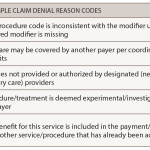The key benefits of this best practice are to prevent lost or delayed revenue from billing the incorrect insurance and to maximize cash collections at the time of the patient encounter.
Check Prior Authorizations at Least 5 Days Prior to the Date of Service
Prevention of lost revenue due to the lack of prior authorization denials is a key area in claims submission. Every procedure or drug therapy that requires prior authorization must be completed before the patient’s visit. Although this is not 100% preventable for denials, due diligence should be adhered to on the practice end, which can be helpful in appealing a denial.
Payer Policies & Coding Guidelines
Being aware of and understanding Medicare local coverage determination (LCD) policies, as well as private payer contracts, are vital to reduce denied claims. All practice staff should understand individual payer policies and coding guidelines, because they usually include what is covered and not covered. Before submitting any claim, all procedural and diagnosis codes should be reviewed and scrubbed if necessary. Ensuring that all CPT, ICD-10 and HCPCS codes are appropriate for the service before submitting to the payer can help reduce the percentage of claims denied, delayed or partially paid, since this affects the practice’s revenue.
Maintain Vigilance
The areas mentioned above are just a few of the key areas of practice management that should be reviewed on a quarterly basis. To continuously improve effectiveness and efficiency of the revenue cycle, in-depth policies and procedures are needed to support a continuous learning model in the practice. The practice policies and procedures should include:
- Developing a well-documented claim-correction process;
- Trending issues by payer to identify critical issues;
- Collecting accurate documentation on all payer-related issues to support effective contract negotiations;
- Creating a teamwork approach for clinical services, patient accounting and contracting to understand the revenue cycle of the practice;
- Creating a culture of accountability for departments, teams and individuals; and
- Tracking preventable denials back to the source for a permanent fix.
By ensuring only clean claims are submitted, practices can work toward processes to make these crucial elements a part of your practice’s operational flow. Clean claims lead to an efficient practice with faster reimbursement and an organized work flow.
For questions on claims submissions, coding, insurance or general practice management, contact the ACR practice department at [email protected].
Reference
- Medicare Managed Care Manual (Rev. 83). 2007 Apr 25.



